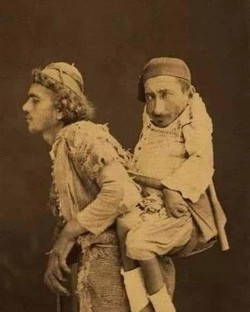
التقطت هذه الصورة في دمشق عام 1899. القزم سمير. إنه مسيحي ولا يستطيع المشي. وحمل على ظهره محمد. إنه مسلم وهو أعمى.
كان محمد يعتمد على سمير ليخبره إلى أين يذهب ، ويستخدم سمير ظهر صديقه للتنقل في شوارع المدينة. كانا يتامى ويعيشان في نفس الغرفة.
كان سمير حكواتي (قَصَّاص شعبي)، وكانت لديه موهبة السرد الممتع ، وروى قصص ألف ليلة وليلة لزبائن مقهى في دمشق ، باع محمد (الحمص المسلوق) أمام نفس المقهى وكان يحب الاستماع إلى قصص صديقه.
ذات يوم ، عندما تقاعد إلى غرفته ، وجد محمد رفيقه ميتًا. بكى وناح صديقه سبعة أيام متواصلة. وعندما سئل عن كيفية انسجامهما بهذا الشكل كونهما من ديانات مختلفة ، قال هذا فقط:
"هنا كنا نفس الشيء" ، مشيرًا بيده إلى قلبه.
لقد كبر الإثنان وهما يتيما الأب والأمّ والعائلة، تقاسما الغرفة نفسها، وأكملا مسيرة العيش وسط صرامة الحياة وقسوتها. وعندما مات المسيحي استمر المسلم بالبكاء، حتى وجدوه بعد أسبوع ميتاً من الحزن على رفيقه.
This photo was taken in Damascus in 1899. The dwarf is Samir. He is a Christian and cannot walk. The one who carries it on his back is Muhammad. He is a Muslim and he is blind.
Mohamed relies on Samir to tell him where to go, and Samir uses his friend's back to navigate the city streets. They were both orphans and lived in the same room.
Samir was a hakawati, he had the gift of narration and told stories of a thousand and one nights to the customers of a cafe in Damascus, Mohamed sold bolbolas in front of the same cafe and liked to listen to his friend's stories.
One day, when he retired to his room, Muhammad found his companion dead. He wept and mourned his friend for seven days straight. When asked how they got along so well, being of different religions, he said only this:
"Here we were the same", pointing with his hand to his heart.


